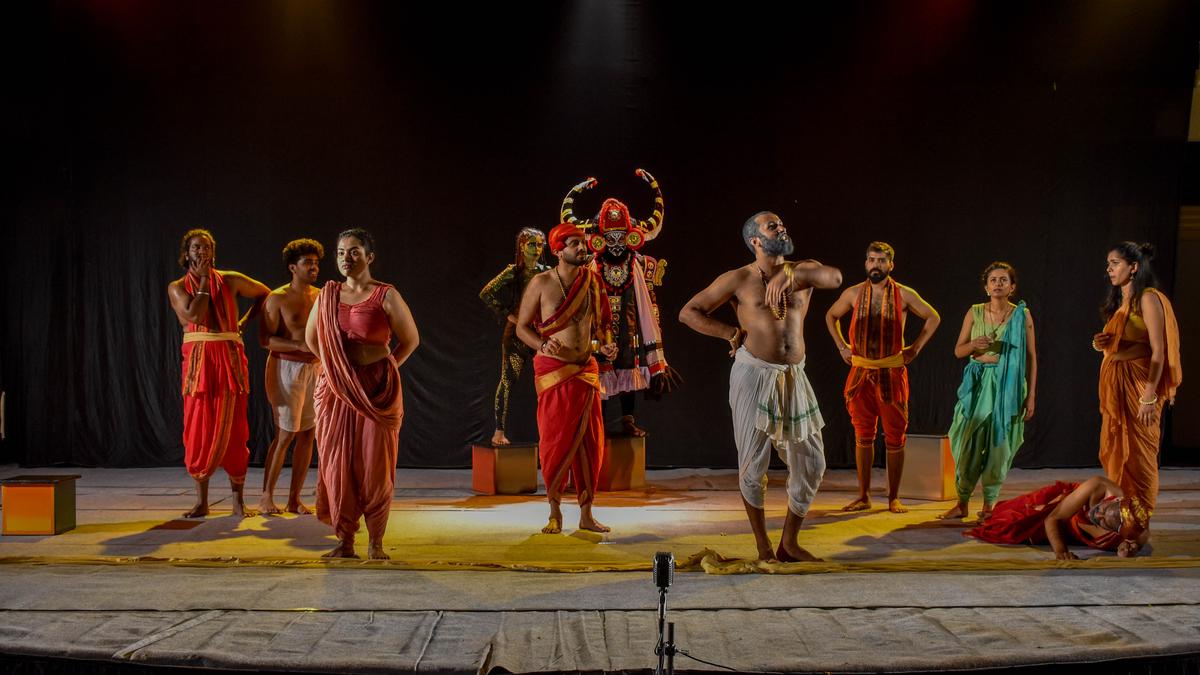
Mahesh Dattani’s new play brings a gender-bending farce to Bengaluru with Yakshagana flair
The Hindu
Directed by renowned writer, playwright and actor Mahesh Dattani, the play is an adaptation of the 7th-century play, Bhagavadajjukam (Sanskrit, ‘Bhagavat’ – hermit; ‘Ajjuka’ – harlot), also known in English as The Ascetic and The Courtesan. According to the synopsis, this play is one of the oldest surviving plays in Sanskrit literature, it is a fine example of a ‘prahasana’, or farce. Layered in witty exchanges about dharma, it is centered around the transmigration of souls between the two titular characters leading to confusion and chaos for the supporting characters who have no answer to the absurdity of it all, said the synopsis.
Punaha, a theatre company based in Udupi is bringing its latest production Yogi Mattu Bhogi for the first time to Bengaluru this week, starting with a show on February 6 at Bangalore International Centre (BIC), Domlur at 7 p.m.
Directed by renowned writer, playwright and actor Mahesh Dattani, the play is an adaptation of the 7th-century play, Bhagavadajjukam (Sanskrit, ‘Bhagavat’ – hermit; ‘Ajjuka’ – harlot), also known in English as The Ascetic and The Courtesan. According to the synopsis, this play is one of the oldest surviving plays in Sanskrit literature, it is a fine example of a ‘prahasana’, or farce. Layered in witty exchanges about dharma, it is centered around the transmigration of souls between the two titular characters leading to confusion and chaos for the supporting characters who have no answer to the absurdity of it all, said the synopsis.
Translated to Kannada by Vishvajith Madhavamurthy, in this version of the play Dattani plays around with the idea of gender, its expression, perception, spectrum and the exploration of what one truly is with a confrontation of stereotypes using humour and catharsis.
On being asked why the director chose the play, Dattani told The Hindu he decided to take up the play as he had seen an English language presentation of the play in the U.S. earlier, and that motivated him. “What struck me first was the comic element of the play. The play gives a time scope for transposing gender and soul, and a hint of crossing sexuality. The play explores how binaries are swapped, and in the swapping some gray areas are created,” he said.
The director said that the play is very relevant to our times. “Just as modernity began with questioning class differences and urban v/s rural, I think today, we are looking at removing these artificial constructs of gender and sexuality. It was easy to extend all of this in my adaptation,” he explained.
With Yakshagana elements throughout the play, Yogi Mattu Bhogi comes alive when the classic Sanskrit text and the physicality of theatre gel seamlessly with the traditional dance theatre form from coastal Karnataka. Yakshagana movements choreographed by popular Yakshagana guru Bannanje Sanjeeva Suvarna, Dattani said that his choreography is the highlight of the play. “I met Guruji many years ago and visited his school. I liked his openness and when one of our actors mentioned that he was learning the dance form from him, it seemed perfect to bring the Yakshagana element in and by the guru himself. Of course, there were challenges when it came to his availability as his health was not in good shape,” he said.
“We used a lot of elements from his traditional style of choreography. I managed to convey the ‘prahasana’ or farce to him, and he came up with an interesting Ganapathi Vandana, the entry of Yama in the play was also choreographed by him which is fabulous,” said Dattani.













